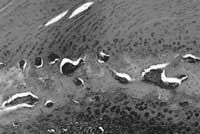Violent HIV attack strategy

Scientists at the University of California have conducted research to learn about the HIV attack strategy and have recently released the results. It seems that the HIV virus takes very little to kill the T cells that protect us from infections and provoke AIDS, for which the virus becomes aware of the machinery that cells have to produce proteins, to replicate itself and push them to kill them.
When the HIV virus contaminates a cell, the cell's energy production and DNA repair systems are inactivated. The genes that serve to defend themselves are activated and in the end the cell dies. In other words, the cell seems to be suicidal to prevent the virus from spreading to other cells. At first many T cells die, then the number of cells is stabilized and this new level determines the duration of the patient's life.
The treatments currently used aim to avoid replication of the virus by using anti-enzyme drugs of the virus. However, it seems that contaminated cells can be able to identify and increase the resources they have to combat infection, and that's what needs to be investigated in the future.





